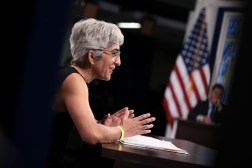Minimal improvement in federal IT workforce satisfaction in 2016 — report

Federal IT workers are not much more satisfied with their work than they were last year, and they are still less engaged compared to other federal workers overall, according a new Partnership for Public Service report.
PPS ranked IT workers at an engagement index of 56.8 — federal employees overall scored a 59.4 — as part of its latest annual “Best Places to Work in the Federal Government” rankings, released Thursday, based largely on the Office of Personnel Management’s Federal Employee Viewpoint Survey. IT specialists were less than a percentage point more engaged than they were year before.
The report doesn’t track why IT workers are unsatisfied, but agency leaders use the tool to prompt an annual conversation around workforce concerns.
[Read more: As feds’ job satisfaction rises, IT and cyber workers’ lags — ‘Best Places to Work’ report]
But some agencies did see some improved engagement with their IT workers. The Department of the Interior, in particular, saw the greatest bump out of large agencies with its IT workers — a 5.2 point increase from an index score of 59 in 2015 to a score of 64.2 in 2016.
The Social Security Administration’s IT specialists had the most significant drop in satisfaction — 3.4 percentage points from 71.4 in 2015 to 68 in 2016.
The index score is calculated from a weighted formula based on responses to three questions:
- I recommend my organization as a good place to work.
- Considering everything, how satisfied are you with your job?
- Considering everything, how satisfied are you with your organization?
“The low employee engagement score for IT specialists is particularly troubling because of the importance of computer systems to the basic functioning of government, from managing information and finances, communicating internally and interacting with the public,” the report notes.
The report describes how government computer networks experienced in 2015 more than 77,000 intrusions, an increase of 1303 percent since 2006.
The PPS rankings include breakout scorings for five “mission-critical occupations”: economist, auditor, HR specialist, contract specialist and IT specialist.
“The Office of Personnel Management and the Chief Human Capital Officer Council have focused on these occupations because shortages or a loss of staff in these job categories could interfere with the ability of agencies to effectively accomplish their missions,” according to the report. And of those five mission-critical occupations, IT specialists had the lowest satisfaction index.
“The momentum is moving in the right direction,” Sean Morris, principal at Deloitte Consulting and federal human capital leader, told FedScoop. But he said leadership needs to continue to drive those scores upward — particularly concentrating on IT specialists in their agencies.
When discussing why this dissatisfaction persists, Morris said that “people immediately say, well it’s the millennials and they’re not happy in IT.” But he noted that millennials are only about 7 percent of U.S. federal workforce, and therefore the dissatisfaction is not exclusive to millennial workers.
“You know the reality is the government has been challenged, in general, in being able to attract and retain millennials, and when we’re talking about IT that’s particularly problematic,” Morris said. “Because you’ve got these new technologies coming out and so it’s highly likely, with limited training budgets, we’re going to need to bring in millennials to do that work. And if we can’t get them in that door, and once they’re in the door, retain them, those are some significant headwinds.”
Morris recommended that agencies focus on training their IT management staff in leadership skills. He noted that often those who end up in management were recruited for their technical skills specifically, and “when they’re thrust into senior leadership situations they’ve not had the more well-rounded background to be able to work with these personalities and things that they’re then managing.”
The problem, he said, is “particularly acute in communities around IT.”
Contact Samantha via email at samantha.ehlinger@fedscoop.com, or follow her on Twitter at @samehlinger. Subscribe to the Daily Scoop for stories like this in your inbox every morning by signing up here: fdscp.com/sign-me-on.





